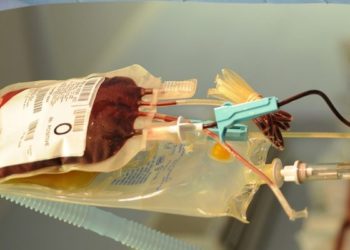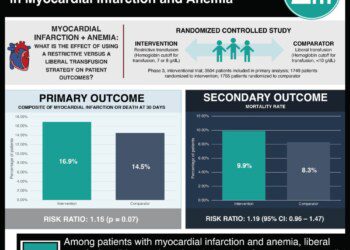Tranexamic acid during joint surgery may reduce need for blood transfusions
1. Patients receiving tranexamic acid during total hip and knee arthroplasty had lower rates of blood transfusion.
2. Tranexamic acid use was associated with a shorter hospital stay and lower hospital cost.
Evidence Rating Level: 2 (Good)
Study Rundown: Perioperative blood loss and blood transfusions after orthopedic surgery are a concerning complication for which various preventative strategies exist. One pharmacologic approach is the use of tranexamic acid, an antifibrinolytic drug that inhibits clot breakdown by reducing the binding of plasminogen to fibrin. This study was conducted to determine the effectiveness and safety of tranexamic acid use during orthopedic surgery. It looked at patients undergoing total hip or knee arthroplasty in U.S. hospitals between 2006 and 2012. During this time period, perioperative use of tranexamic acid increased from nearly 0% to over 11%. Patients who received tranexamic acid had significantly lower rates of transfusion, thromboembolic complications, acute renal failure, and combined complications compared to patients not receiving tranexamic acid. Further statistical analyses showed that tranexamic acid decreased the need for blood transfusions by 69% without increasing complication rates.
A major strength of this study is its large sample size, since previous studies confirming the effectiveness of tranexamic acid were too small to study safety concerns regarding rare complications. Additionally, there was a high degree of external validity given design as a population based analysis reflective of real world practice. Its limitations include a lack of detailed clinical information to determine the trigger for the transfusion, residual confounding, and the study of complications that only occurred during the patients’ hospital stay.
Click to read the study, published today in the BMJ
Click to read an accompanying editorial in the BMJ
Relevant Reading: Alternative procedures for reducing allogeneic blood transfusion in elective orthopedic surgery
In-Depth [retrospective cohort]: This study was a retrospective, population based analysis of over 870,000 patients in the Premier Perspective database who underwent total hip or knee arthroplasty at 510 U.S. hospitals between 2006 and 2012. The authors determined that patients who received tranexamic acid on the day of surgery had lower rates of allogeneic or autologous transfusions (7.7 vs. 20.1%, p<0.001), thromboembolic complications (0.6% vs. 0.8%, p=0.0057), combined complications including cerebrovascular events, myocardial infarction, and in-hospital mortality (1.9% vs. 2.6%, p<0.001), and admission to an intensive care unit (3.1% vs. 7.5%, p<0.001) compared to patients not receiving tranexamic acid. Furthermore, the cost of hospital stay was less in the group receiving the drug ($14,890 vs. $15,110, p<0.001). Multivariable logistic regression models demonstrated that tranexamic acid use was associated with up to a 69% decreased need for blood transfusions (odds ratio varied 0.31-0.38 depending on dose category) with no significantly increased risk of thromboembolic complications, acute renal failure, combined complications, or admission to an intensive care unit. In particular, 2000mg tranexamic acid was found to have the best effectiveness and safety profile. In addition, the authors performed a propensity score analysis in which 5,486 patients receiving the drug were matched to controls who did not receive the drug, and found results that confirmed the effectiveness of tranexamic acid in reducing the need for blood transfusions without increasing the risk of complications.
More from this author: Smoking bans in prisons associated with reduced prisoner mortality, Over half of Viagra in Netherland’s sewage unaccounted for by legal dispensing
Image: PD
©2012-2014 2minutemedicine.com. All rights reserved. No works may be reproduced without expressed written consent from 2minutemedicine.com. Disclaimer: We present factual information directly from peer reviewed medical journals. No post should be construed as medical advice and is not intended as such by the authors, editors, staff or by 2minutemedicine.com. PLEASE SEE A HEALTHCARE PROVIDER IN YOUR AREA IF YOU SEEK MEDICAL ADVICE OF ANY SORT.






